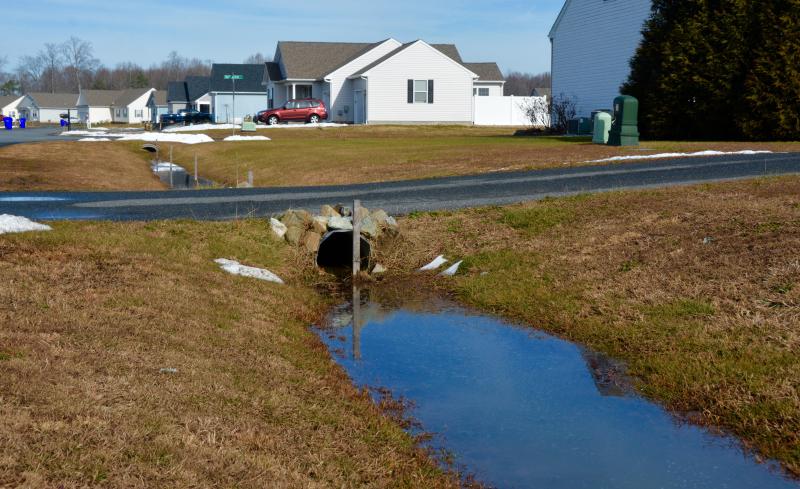Sussex officials tackle drainage, construction issues
Sussex County Council has introduced an amended ordinance to revamp county code dealing with drainage, lot grading, road construction, bonding and project construction including closeout regulations.
“We cannot fix the ills of the past, but we can fix potential future issues,” said county engineer Hans Medlarz.
Nearly eight years ago, former Sussex County Councilwoman Joan Deaver raised questions about the lack of a drainage ordinance in county code. That came after numerous complaints from residents in her district who had serious flooding issues in their communities, especially during the spring of 2010 when twin blizzards in early February were compounded by excessive rain.
But nothing happened until county council approved the formation of a working group two years ago, setting in motion the process to amend current regulations.
After a lengthly presentation by Medlarz and assistant county attorney Vince Robertson, county council voted 5-0 to introduce the amended ordinance. A public hearing before county council and the planning and zoning commission will be scheduled at a later date.
The 24-person working group was made up of representatives of the building industry including homebuilders, site-design engineers and site contractors, two homeowners and Sussex Conservation District staff and county staff.
Lot grading: A first for Sussex County
Under the proposed ordinance, every lot within a subdivision must be graded for proper drainage. That design plan must be inspected and a building permit would not be issued until a lot-grading certificate is provided to Sussex County.
Currently, there are no regulations in county code relating to lot drainage, so water frequently drains to the last lots sold in a subdivision.
In addition, developers must provide a bulk grading plan for an entire subdivision, which is an initial grading plan for all drainage features such as stormwater conveyance infrastructure. A detailed grading plan showing final grading for all lots would also be required.
Robertson said the proposed regulations provide a greater level of protection for developers, builders, homeowners and the county.
Robertson said road construction standards and drainage regulations go hand in hand. The proposed regulations also provide more specific standards for swale design and slope, sidewalk location, installation of driveway culverts and on-street parking.
“We now have regulations for road design, and we'll not see stormwater issues again,” Medlarz said.
The proposed ordinance includes a clearer set of closeout procedures for projects to determine when final approval could be issued by the county. Included are a timeline for top-coat paving and a mechanism for county inspectors to address a punch list to complete a project.
Robertson said the county currently has no regulations. “Now a project can exist forever in construction phase,” he said.
No new fees included in proposal
The proposed ordinance would require that all fees be established by county council as part of the annual budget process and not left to the discretion of the county engineer. Medlarz stressed that new or increased fees are not part of the recommended ordinance.
He said county inspectors can handle the workload, but are at the limit. “We are not creating regulations to hire more people,” Medlarz said.
Councilman George Cole, R-Ocean View, suggested the county provide more funding to the Sussex Conservation District to give them responsibility to implement and enforce the proposed regulations. He said it would be similar to financial support to provide more Delaware State Police troopers in the county.
Medlarz said the district's jurisdiction is stormwater management and not the specifics included in the proposed ordinance amendments. “It should be us protecting consumers and not a third party,” he said.
Enforcement was an issue discussed by council. “Where is the heavy hammer to ensure accountability?” asked Councilman Rob Arlett, R-Frankford. “It should be very clear and not drawn out.”
“Right now a lot is discretionary,” answered Robertson. “This sets forth clear standards and enforcement to comply.”
Among other proposed regulations are:
• Substantial construction must be actively maintained and/or underway within 5 years of the date a final site plan is recorded. The phrase “actively maintained” clarifies the current code, which uses the term “substantially underway.”
• All amenities would be bonded as a separate phase of a subdivision.
• Construction – such as site work – could begin without bonding as long as no lots are transferred or sold.
• Bonded phases would not be allowed to be altered or amended without a new bond in place.
• Commercial site plans would be valid for 5 years. Under current code, commercial plans have no expiration date.
















































